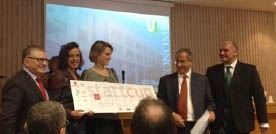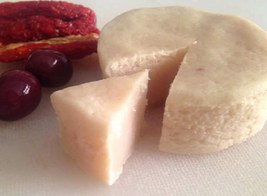Nutrition: vegetable cheese from nuts to fight cholesterol
21/1/2016
A team of researchers from ENEA, University of Tuscia and VegCoach Store succeeded in producing food with high nutritional value using pine nuts, almonds and hemp seeds. Their project PRODIGI was awarded the third prize at Start Cup 2015, the competition for the best business ideas in the Lazio Region (Italy).
 This innovative vegetable cheese with high nutritional value and rich in phytosterols, vegetable molecules with a cholesterol-lowering effect is the first vegetable cheese made from fermented, probiotic-rich pine nuts, almonds and hemp seeds and it has been developed within the Project PRODIGI, born out of a collaboration among ENEA, University of Tuscia and the company VegCoach Store.
This innovative vegetable cheese with high nutritional value and rich in phytosterols, vegetable molecules with a cholesterol-lowering effect is the first vegetable cheese made from fermented, probiotic-rich pine nuts, almonds and hemp seeds and it has been developed within the Project PRODIGI, born out of a collaboration among ENEA, University of Tuscia and the company VegCoach Store.
PRODIGI, ranked third in the Category “Life Sciences” of Start Cup Lazio 2015, held under the National Award for Innovation promoted by PNICube, the Italian Association of University incubators and business plan competition. The primary objective of Start Cup Lazio is promoting the economic development of the territory by providing support to the creation of innovative start ups in business incubators, fab-labs and coworking.
PRODIGI stands for “New Foods from digestive processes of micro-organisms on vegetables and nuts”, a project aiming to develop new low-environmental-impact and sustainable foods with high nutritional value and beneficial to the health, based on a rational and efficient use of raw materials and the reduction of CO2 emissions.[1]
 The development of new green foods is one of the core activities conducted at the laboratory PROBIO (Bio-PROcesses and BIO-products) of the ENEA Casaccia Research Center, which has a long-lasting experience in research on genetic diversity, in the nutraceutical composition of nuts and the promotion of agricultural raw materials, also through participation in national and international projects and the development of the project SAFENUT, to identify, conserve and use hazelnut and almond genetic resources.
The development of new green foods is one of the core activities conducted at the laboratory PROBIO (Bio-PROcesses and BIO-products) of the ENEA Casaccia Research Center, which has a long-lasting experience in research on genetic diversity, in the nutraceutical composition of nuts and the promotion of agricultural raw materials, also through participation in national and international projects and the development of the project SAFENUT, to identify, conserve and use hazelnut and almond genetic resources.
The ENEA Casaccia Research Center has a technological hall and innovative scientific instruments for the study of the bioavailability of molecules (the fraction of nutrient capable of being absorbed by a living organism) and for the chemical and biochemical analysis of the main nutritional factors necessary to the knowledge of the processes of fermentation in genetics and microbial physiology.
For more information please contact:
Loretta Bacchetta, Centro Ricerche Casaccia, loretta.bacchetta@enea.it
[1] As shown by a VegCoach Store study, given the same nutritional intake, a vegetarian meal saves the equivalent of 3.2 kg of CO2 as compared to a meat - based meal, also with a significant water-saving.
